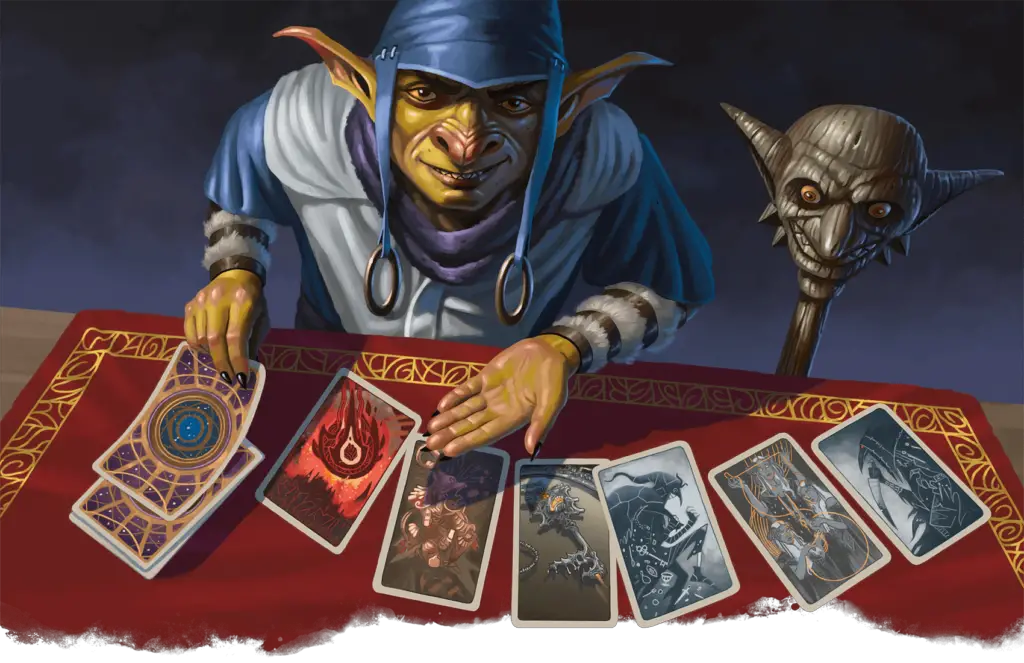Goblin – bard by Igor-Grechanyi, Creative Commons Attribution-Noncommercial-No Derivative Works 3.0 License
There is no denying that Charisma is an influential skill in a tabletop roleplaying game like Dungeons and Dragons. As one of the six ability scores, Charisma impacts the very development of a character. In fact, several classes utilize Charisma as their main statistic, specifically Bards, Paladins, Sorcerers, and Warlocks. There is a lot of variability between these classes, so it is worth delving into the different ways in which a character may employ Charisma.
Charisma, at its core, is an individual’s ability to attract and influence others. A person with charisma possesses a personality that compels action or devotion in others—the power charisma holds is in its effect on others.
Charisma is communicating effectively and attracting attention. Oratorical skills are typically helpful, but the very presence of a person exuding charisma may be enough to shift the scene in their favor. Terms often used to describe a person with charisma are calm, bold, confident, assertive, persuasive, exciting, dominating, authentic, charming, and focused.
Above all else, a player should remember that charisma is a tool of emotional manipulation. A charismatic person can make another overlook rationality and reason through any of the four skills of Charisma: deception, intimidation, performance, or persuasion.
How Charisma Manipulates
Being charismatic does not mean you are a bad or manipulative person, but it is evident that charisma inherently influences people into embracing the vision of the charismatic.
Charisma dilutes judgment, even having the power to disguise a psychopath or cause genocide. A charismatic person has the sharp instincts that allow them to intuitively recognize what will trigger a desired emotional response, whether that be in the way they speak, the stories they tell, displaying emotions themselves, or putting on a persona that disarms a person.
A player should remember that the main motivators that allow a person to be manipulated are fear and adoration. Describing fear is simple. It includes fear of change, loss, being revealed, hurt, alone, and so forth. Adoration as a manipulating tool is a bit trickier to describe.
Often, a person may yield to charisma only if they share the same core principles and ideals as the charismatic person. In these cases, charisma should be seen as an ideological self-enhancement: by flattering or believing in a charismatic person, we are flattering and believing in ourselves because we see the “best” (or what we consider the best) of ourselves in the person we support.
Any and all of these methods can be used to manipulate a person or an entire village into agreeing with and doing the will of a Charisma-ladened character. Let’s explore some tactics a player can use to roleplaying Charisma in-game.
Charismatic Tactics
A player whose character has high charisma may wish to act out how they influence others. However, just because a character has high charisma does not mean that the player has to be charismatic when roleplaying. If a player is uncomfortable roleplaying directly, consider describing how your communicative exchange would go with the following tactics and the intended result desired, throwing in some in-character phrases when appropriate.
People with charisma tend to use the following verbal devices:
- Using lists when talking about issues
- Telling stories and anecdotes that capture attention
- Linking shared underlying emotions and morals to their messages
- Asking rhetorical questions that engage the audience without taking away focus from themselves
- Varying their tones and using pauses for emphasis
Sprinkle the following nonverbal characteristics into how you describe what your character is doing:
- Displaying a genuine smile or firm expression
- Maintaining eye contact—positive or negative
- Using natural gestures and facial expressions to express emotions and draw attention
- Facing toward those engaged
- Lightly touching (on the elbow, arm, shoulder, back) during conversations
If you hope to command an audience without uttering a single word, focus on describing your assertive body language: the way you hold yourself, your gestures, your subtle micro-movements and even your facial expressions. When witnessed by others, it will send a signal about the kind of person you are and the presence you hold.
Using Oratory Charisma In-Game
Persuasion, Deception, & Intimidation
Like me, you as a player might not be gifted in these charismatic attributes in real life. Nevertheless, you can always use the Dungeon Master as a key resource for how to influence an NPC. A charismatic person is adept at reading and understanding people, so before interacting with a target, channel your inner Mentalist by observing quick tells into their lives and motivations. Ask your Dungeon Master what you observe that relates to the following about the target:
- Are they family-oriented (wearing an apron with sticky finger smudges around the knees and waist; interacting with passerby children with a smile or treat) or individualistic (focused on their work; signs they are unwed and may live alone)?
- Are they rich or poor?
- Are they honest (do good deeds without recognition) or deceitful (shifty-eyed)?
- Are they a part of a group, club, or organization (look for pendants, papers, or signets)?
- Are they in support of the law or in civil unrest?
- Do they hold a position of power? Do they desire to be in power?
The answer to each of these questions, and more along the same lines, can paint a picture of the target’s values, motivations, and character, and give you something to play into that would put them on your side. Most manipulators can discover a person’s weakness or desires, use it to get their attention, then convince them of giving up or doing something to fulfill their own purposes.
A family-oriented person may be more easily influenced by compassionate stories that involve tradition, children, community, and persevering through trials. An individualistic NPC may respond better to rhetoric that involves getting what you deserve through your own hard work. A player could sweet-talk a person who thinks highly of themselves; become a hero-of-the-people by discussing how laws must change to support the good of the common man; curry favor with people who hold power by relating how they keep order to society and raise up the bottom line through their own prosperity. Honestly, just by seeming sincere and passionate, a player could intrigue and attract people into joining their cause.
When you find the angle that seems to be working (you can ask your Dungeon Master how the target(s) are responding to the conversation and make changes in the moment based on that), it is up to your Charisma rolls to do the rest.
Using Subtle Charisma In-Game
Deception, Intimidation, & Performance
We’ve covered how to persuade, deceive, and intimidate in-game through speech, but what about the underlooked skill of Charisma, performance, that involves a lot less talking? Let’s explore other methods for utilizing Charisma that don’t involve lengthy speeches.
There are many reasons a character may wish to apply subtle charisma: to gain the favor, sympathy, or support of a person or people; to draw attention to oneself—cause a distraction, uplift spirits, draw a crowd, start a mob; to make a good impression on others; or to spread rumors about oneself.
Depending on your goals (virtuous or selfish), consider using the following indirect methods of applying Charisma:
- Doing acts of service without the expectation of anything in return
- Giving gifts to others
- Engaging in physical touch
- Paying a person compliments
- Spreading news (or rumors or lies)
- Making someone else look good (or bad)
Attempt an insight check to see what someone is in need of and then help fulfill that need in order to gain their favor and the favor of those who hear about it. Or, find out what someone needs and manipulate them into doing your bidding by promising the help they need.
Remember to always explain to your Dungeon Master what your intentions are so that your rolls and actions produce the desired effects.
Other subtle methods of Charisma involve how your character looks, be it beautiful or repulsive. A pretty face goes a long way in charming a person. If a character is crippled and yet successful in overcoming their physical challenges, this may serve as an inspiration to others, who will be more likely to follow or listen to this determined person. Or, as a cripple, one may gain the pity of others so that they may do favors.
In action, a charismatic character may impress people by taking pain or hardship well, or by not being arrogant or quick to react in anger to aggression. All of these methods serve to get people on your side for when you need them.
Furthermore, a mysterious person may have just as much allure as an outright charismatic one. At a distinguished dinner, rumors may stir about the cloaked man who sits dignified and alone yet strong and comfortable. People who feel they have the most influence may approach the mysterious figure and be willing to give favors in order to make sense of the person they do not understand. By not revealing oneself, a charismatic person can then become any number of personas. This leads into the final skill of Charisma we have yet to discuss: performance.
Performance checks are often rightfully applied in deeds of acting, singing, dancing, performing magic tricks, storytelling, and music-playing. But consider these other ways to use performance in-game:
- Drawing attention by creating a ruckus
- Engaging with a person in intimacy (this can involve being flirtatious, seductive, physical, and so forth)
- Generally trying to get people to pay attention to you
- Employing the perfect comedic timing
- Being adorable or cutesy
- Stirring up a crowd to make a mob
- Trying to look more bumbling/adept/aggressive/out-of-character than you really are in order to deceive others
- Adding pizzazz and flair to whatever you do
- Sticking to your principles and performing your duties in the face of unexpected encounters
By simply being the person one wishes to be perceived as, a character’s charisma may be utilized subtly and effectively.
Negative Charisma
Quickly think of a handful of people who occupy space in your head because of how much you dislike them and their actions. Hatred, disdain, and disgust can be powerful tools in influencing people. By being a villainous or disregarded figure, you can manipulate people either by reverse psychology or deception:
- Exploit others into opposing ideas they think you support
- Unify people in protest by being the bad guy they can collectively hate
- Goad people into attacking you when it’s expedient for you
- Be the fall-guy so someone else doesn’t take the heat
- Make people assume you’re a fool when you’re really engaged in a mastermind scheme
- Give people a false sense of security by thinking they have you figured out
- Discover who can’t be trusted by seeing who tries to take advantage of you
- Call people who threaten you on their bluffs by brazenly daring them to act against you and enforce their word
- Gain power by being the person who plays hardball, forcing others to compromise
- Claim to be a part of an organization and become a bad figure so that people begin to oppose the organization
- Manipulate people into hating the person you are disguised as
- Convince someone to leave you alone by being rude
- Become a scapegoat to mask the truth
Mass Influence: Building a Tribe
Some people will not be affected by a particular type of Charisma. In D&D, you need to find your niche audience, from humble townsfolk to creepy cultists. In numbers, there is power, so by finding and cultivating a group of like-minded people who follow you, a charismatic character will gain more influence over a larger variety of individuals, as one’s cult can reach out to those around them in unique ways unavailable to the character.
As stated above, people will often only rally behind a figure if they share the same ethics, values, goals, and morals. If your character is trying to build a tribe, first develop these things and campaign on an unwavering platform that garners fanatics.
Charismatic Flaws
We’ve discussed a myriad of ways to utilize Charisma in-game to get what you want. However, a player who has decided to use Charisma as their main stat may wish to include some character flaws as a result of their high Charisma.
About the disadvantages of being charismatic, author Robert B Kaiser said: “Confidence becomes hubris, pushing the envelope gets reckless, vision becomes a pipe dream and the dramatic flair seems melodramatic and distracting.”
Here are some flaws a character may integrate:
- Narcissistic
- Addicted to attention
- Habitually lying
- Having an unintended intimidating presence
- Being overconfident in one’s abilities
- Kickstarting grand schemes without developing the details
- Becoming too ambitious and getting in over one’s head
- Being caustically manipulative
- Being inauthentic in conversation and displaying emotion
Conclusion
Overall, in Dungeons and Dragons, Charisma is being in-tuned with the magic within, your galactic repertoire, the strength and ability of your character, and your innate potential to achieve your goals. Charisma can be utilized to manipulate people into doing your will, to win people over to your side, or to keep people away from you. Charisma comes from a character’s appearance—alluring, repulsive, attention-grabbing, or distressing—and the way a person behaves. We hope this article has helped you find exciting ways to roleplay Charisma, always keeping in mind that your Dungeon Master is your greatest tool into utilizing your character’s statistics to accomplish your goals.




